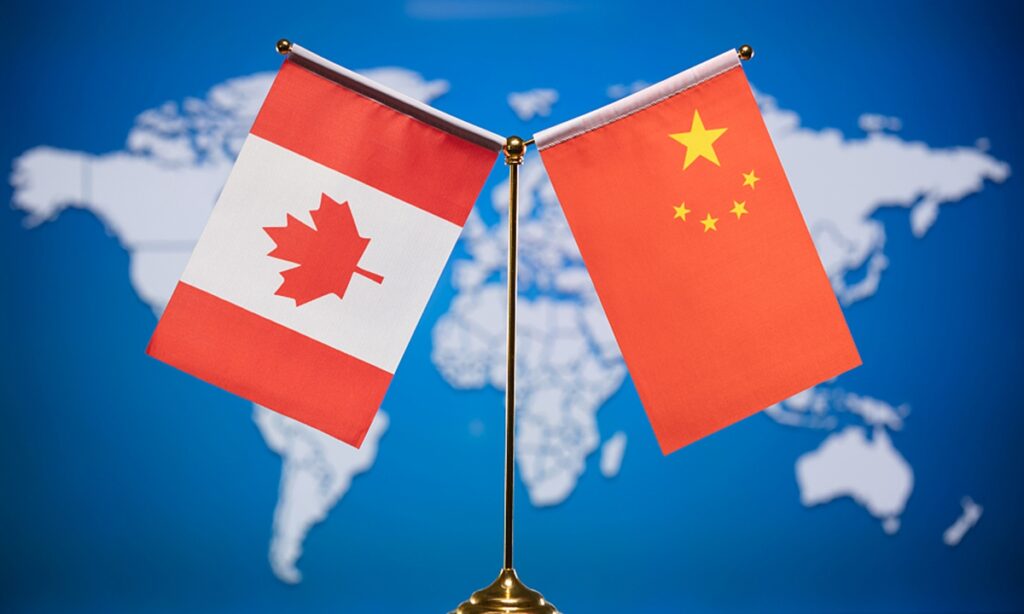Climate talks seen as opportunity to ease strained ties: expert
Canadian Minister of Environment and Climate Change Steven Guilbeault kicked off his trip to Beijing on Saturday to join talks on climate change and biodiversity issues, making him the first Canadian minister to visit China in four years.
The visit could be seen as an opportunity to ease the strained China-Canada relations, experts said, as climate cooperation has always been a window for de-ideologizing cooperation between China and the West, and this could then expand to other fields.
Guilbeault is set to attend the annual meeting of the China Council for International Cooperation on Environment and Development (CCICED), a high-level international advisory body, from Monday to Wednesday.
Canadian Ambassador to China Jennifer May thanked the Chinese side for the work done for Guilbeault’s visit during a meeting with Chinese Minister of Ecology and Environment Huang Runqiu on Friday. May said that she looks forward to further deepening and expanding exchanges and cooperation in the field of environment and climate with the Chinese side, and to jointly address the global environment and climate challenges.
The Canadian minister, who is also a former advocate for environmental groups, said he hopes the two sides can have open and frank conversations about a number of issues relating to climate change and find ways to cooperate, Reuters reported Saturday.
Guilbeault said two important issues he wants to bring up are methane emission reductions and a global renewable energy target, which is being discussed ahead of the UN climate change conference later this year.
He also wants to follow up on the results yielded during the second part of the Conference of the Parties (COP15) to the UN Convention on Biological Diversity (CBD), which was hosted by Canada and presided over by China late last year, according to Reuters.
Founded in 1992, the CCICED is a high-level international advisory body which seeks to foster cooperation between China and the international community on environment and sustainable development policies. It 2023 annual general meeting is scheduled under the theme of “Green Transition for High-Quality Development: Modernization in Harmony with Nature.”
China and Canada, as major countries in the world, have many areas in which they can cooperate in fighting climate change, experts told the Global Times, pointing out that such cooperation will bring positive significance and a demonstration effect to the world.
Both China and Canada are signatories to the Paris Agreement on Climate Change and have made commitments to reduce carbon emissions, Ma Jun, director of the Beijing-based Institute of Public and Environmental Affairs, told the Global Times on Sunday.
“As major countries in the traditional energy chain, the two countries have many prospects for cooperation in the field of energy transformation,” Ma said. “The two countries can also further strengthen cooperation in technological innovation in renewable energy.”
Canada is suffering from extensive wildfires, a natural disaster that has resulted in significant excess carbon emissions. This further emphasizes the importance of a common global response to climate issues, Ma noted.
Anchoring the global carbon market could be another potential area of cooperation, Xia Guohan, founder and director of Zonghengce Strategy Institute and Research Fellow of the Charhar Institute think tank, told the Global Times.
Xia pointed out that Guilbeault visiting China amid prolonged tensions signals a détente between the two sides.
“Fighting climate change is one of the main areas where China and the West have generally been able to de-ideologize and reach cooperation, and a window of cooperation has always been open,” he said.
China welcomed visiting US climate envoy John Kerry earlier in July. Other major countries including France and Germany have also recently sent climate representatives to China.
“Climate cooperation could serve as a knock on the door to improve bilateral relations,” Xia said. “If a relevant cooperation agreement can be reached, then naturally, this can be used as an opportunity to upgrade cooperation and expand it to other areas.”
However, some observers remain skeptical that Guilbeault’s visit to China will result in much substantive cooperation, considering Canada’s limited ability to reduce emissions.
If the Canadian minister demands that China accelerates its “carbon peaking” and “carbon neutrality” targets in a condescending tone, the output could be counterproductive, Xia said.
China-Canada relations took a sharp turn for the worse in 2018 when the Canadian government arrested Huawei’s Meng Wanzhou at the request of the US government while she was transiting a flight in Vancouver. Bilateral relations have not recovered since then.
Earlier in August, China announced a third round of resumptions of outbound group tour services, expanding the scope from 60 to 138 countries and regions. Canada was noticeably absent, which led to Canadian tourism insiders and media outlets expressing concern over a competitive disadvantage in the travel industry.
(Global Times)




